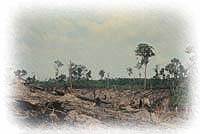
 Poets have written about the 'eternal hills'
and on the scale of a human lifetime, the hills and mountains certainly appear unchanging.
But on a different time scale, a much longer one, the Earth's surfaces go through changes
just as we do. Geologists look at scenery and speak of a 'young river valley', a 'mature,
meandering stream', or an 'ancient core of a mountain range.' Geologists, of course, are
thinking of a very different time scale from the one measuring human lifetimes.
Poets have written about the 'eternal hills'
and on the scale of a human lifetime, the hills and mountains certainly appear unchanging.
But on a different time scale, a much longer one, the Earth's surfaces go through changes
just as we do. Geologists look at scenery and speak of a 'young river valley', a 'mature,
meandering stream', or an 'ancient core of a mountain range.' Geologists, of course, are
thinking of a very different time scale from the one measuring human lifetimes.
 When you look at the history of our 'Water
Planet' in places like the Grand Canyon of the Colorado River or the changes in the
Appalachian Mountains or the modern day explosions of the Cascades volcanoes, you are
looking at the fact that over great periods of time, the world we live on is changing and
evolving.
When you look at the history of our 'Water
Planet' in places like the Grand Canyon of the Colorado River or the changes in the
Appalachian Mountains or the modern day explosions of the Cascades volcanoes, you are
looking at the fact that over great periods of time, the world we live on is changing and
evolving.
We can see these changes clearly in the past 25 years or so. Recent studies show that our planet's atmosphere and climate change and evolve as do our oceans and their currents.
The expectation at NASA's Classroom of the Future is that you will make better choices for your own future and for generations to come when you understand the impact you have on the Earth. New tools and technologies create new and more powerful extensions of what a single human could lift, move, or cut in a day. They create a new responsibility for understanding how our actions and choices influence the direction and rate of change for our planet.
We may need to live 'more lightly' on our home planet, but it is certain that we cannot live on the Earth and have no impact whatsoever on it. Thus it is important that we figure out the best courses of action in light of the information we have now. Let us also be willing to change our minds as new data and understanding come to us from new sources in the future.
 When we see interviews with one of the
astronauts - one of those fortunate representatives of all humanity who have actually left
our planetary cradle for awhile and have seen the Earth from space - we recognize a
wonderful, recurring theme, "What a beautiful, special place our home is." What
a fabulous sight Planet Earth must be for a human looking down from the vast silence of
space. That experience seems to give a different perspective on taking care of 'home'.
When we see interviews with one of the
astronauts - one of those fortunate representatives of all humanity who have actually left
our planetary cradle for awhile and have seen the Earth from space - we recognize a
wonderful, recurring theme, "What a beautiful, special place our home is." What
a fabulous sight Planet Earth must be for a human looking down from the vast silence of
space. That experience seems to give a different perspective on taking care of 'home'.
Many of the world's religions instruct the faithful to be 'stewards' of
the Earth - to use it responsibly, to take care of it, and to pass it on to the next
generation so that they might have good lives and enjoy the beauty and solace that nature
can provide.
The Great Law of the Iroquois suggests that the individual should make no decision about using the Earth's resources until he or she has thought about how that action will impact the group for the next 7 generations! Wouldn't it be great if we could get people today to consider the impact of our environmental decisions just one generation into the future? It would be great if we could recognize the fragility of the planet our children will inherit.
You will make good decisions when you base them on the best information available and consider the impact they will have on the future. Just as the planet we live on changes, so too the quantity and nature of information available to us will change as people like you become the data gatherers and develop new and more efficient ways of studying the Earth. Consider the impact that you will have on our future. Let's explore!
Note: Students may want to begin in the "Modules and Activities" section - teachers, in the "Teachers" section.
All Photos: � 1995 PhotoDisk Inc.
HTML code by Dave McGlumphy
Maintained by ETE Team
Last updated January 11, 1999